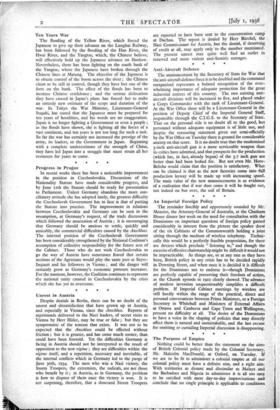An Imperial Foreign Policy The reminder forcibly and opportunely sounded
by Mr. Menzies, the Attorney-General of Australia, at the Chatham House dinner last week on the need for consultation with the Dominions on important questions of foreign policy gained considerably in interest from the picture the speaker drevi of the six Cabinets of the Commonwealth holding a joint sitting through the medium of wireless telephony. Techni- cally this would be a perfectly feasible proposition, for there are devices which preclude " listening in," and though the exercise of effective chairmanship might be difficult it would not be impracticable. As things are, or at any rate as they have been, British policy in any crisis has to be decided rapidly in Downing Street, and when once it is decided it is difficult for the Dominions not to endorse it—though Dominions are perfectly capable of preserving their freedom of action, as the Chanak episode in 1922 clearly showed. The advance of modern invention unquestionably simplifies a difficult problem. If Imperial Cabinet meetings by wireless are still hardly within the range of the practical, direct and personal conversations between Prime Ministers, or a Foreign Secretary in Whitehall and Ministers of Fxtemal Affairs at Ottawa and Canberra and Cape Town and Wellington, present no difficulty at all. The desire of the Dominions to have a voice in the shaping of policies that may directly affect them is natural and unmistakable, and the last excuse for omitting or curtailing Imperial discussion is disappearing.
* * * *


















































 Previous page
Previous page